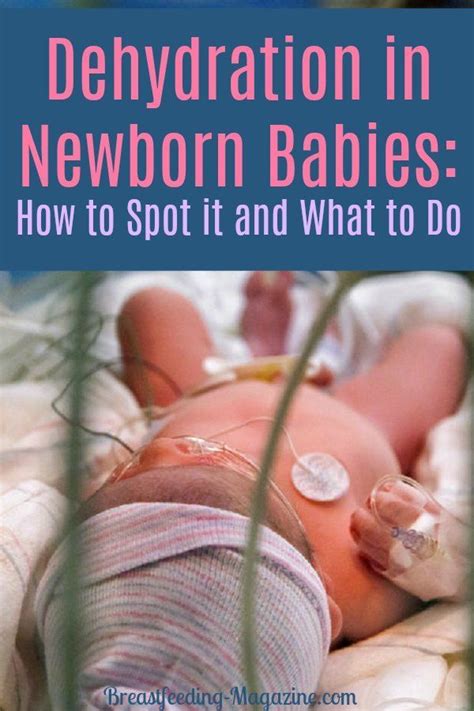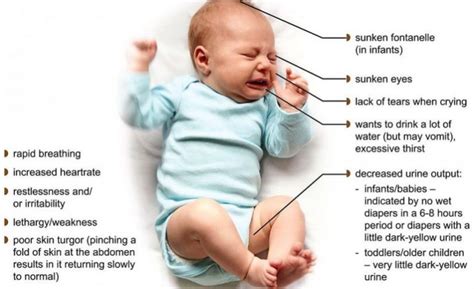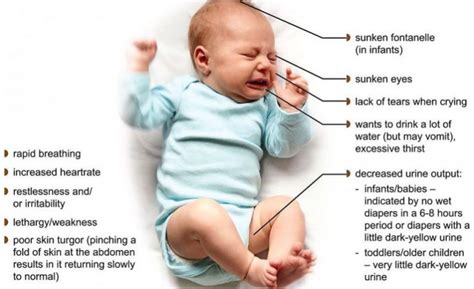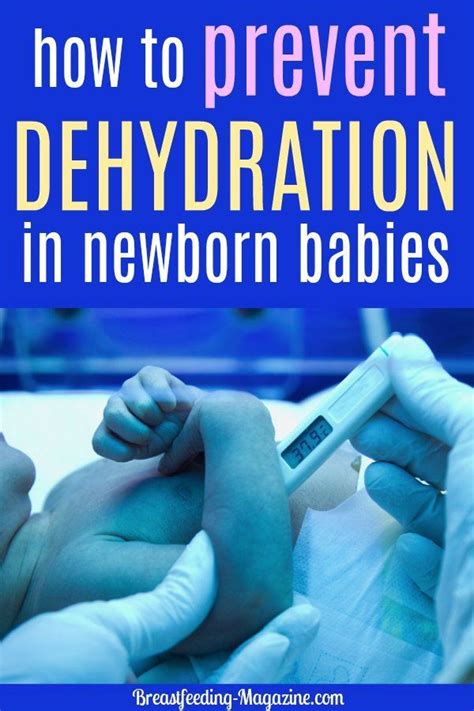Intro
Identify newborn dehydration signs, including dry mouth, fewer wet diapers, and sunken eyes. Learn symptoms, causes, and treatment options for infant dehydration.
Newborn dehydration is a serious condition that can affect babies in the first few weeks of life. It occurs when a baby loses more fluids than they take in, causing an imbalance in their body's water and electrolyte levels. Dehydration in newborns can be caused by various factors, including inadequate breast milk or formula intake, vomiting, diarrhea, fever, and environmental factors such as high temperatures and low humidity. It is essential for new parents to recognize the signs of dehydration in their newborn baby to seek medical attention promptly.
Recognizing the signs of dehydration in newborns is crucial because it can lead to severe complications if left untreated. Dehydration can cause a decrease in blood volume, leading to a decrease in blood pressure, which can reduce blood flow to vital organs such as the brain, kidneys, and liver. In severe cases, dehydration can lead to seizures, brain damage, and even death. Newborn babies are more susceptible to dehydration due to their small body size and high surface-to-volume ratio, which makes them lose heat and moisture quickly.
Newborn babies rely on their caregivers to provide them with the necessary fluids and nutrients to stay healthy. Breast milk or formula is the primary source of hydration for newborns, and it is essential to ensure that they are feeding well and frequently. However, sometimes, despite adequate feeding, newborns can still become dehydrated. It is vital for new parents to be aware of the signs of dehydration and to seek medical attention if they notice any of these signs in their baby. Early recognition and treatment of dehydration can help prevent severe complications and ensure the baby's optimal health and well-being.
Newborn Dehydration Signs and Symptoms

- Dry mouth and tongue
- Few or no tears when crying
- Sunken eyes
- Soft spot on the top of the head is sunken
- Decreased urine output, which can be indicated by fewer wet diapers
- Dark yellow or brown urine
- Decreased stool output or no stools at all
- Lethargy or irritability
- Refusal to feed
- Vomiting or diarrhea
- Rapid heartbeat
- Low blood pressure
- Cool or clammy skin
Types of Dehydration in Newborns
There are three types of dehydration in newborns, each with different levels of severity. These include:- Mild dehydration: This is the most common type of dehydration and can be treated with oral rehydration solutions.
- Moderate dehydration: This type of dehydration requires more aggressive treatment, including intravenous fluids and close monitoring.
- Severe dehydration: This is the most severe type of dehydration and requires immediate medical attention. It can lead to life-threatening complications if left untreated.
Causes of Newborn Dehydration

- Inadequate breast milk or formula intake
- Vomiting or diarrhea
- Fever
- Environmental factors such as high temperatures and low humidity
- Infection
- Congenital heart defects
- Gastrointestinal abnormalities
- Neurological disorders
Risk Factors for Newborn Dehydration
Some newborns are at a higher risk of developing dehydration due to various factors. These include:- Premature babies
- Low birth weight babies
- Babies with congenital heart defects or other underlying medical conditions
- Babies who are not breastfed or have difficulty latching
- Babies who have a fever or infection
Diagnosis of Newborn Dehydration

- Perform a physical examination to look for signs of dehydration, such as dry mouth, sunken eyes, and decreased urine output.
- Take a medical history to determine if the baby has any underlying medical conditions or risk factors for dehydration.
- Order laboratory tests, such as blood tests and urine tests, to check for signs of dehydration and underlying causes.
Treatment of Newborn Dehydration
Treatment of newborn dehydration depends on the severity of the condition. Mild dehydration can be treated with oral rehydration solutions, while moderate to severe dehydration requires intravenous fluids and close monitoring. The healthcare provider may also:- Provide breast milk or formula supplements to ensure the baby is getting enough fluids and nutrients.
- Administer medications to treat underlying causes of dehydration, such as fever or infection.
- Monitor the baby's vital signs, such as heart rate, blood pressure, and oxygen saturation.
- Provide oxygen therapy if necessary.
Prevention of Newborn Dehydration

- Breastfeed frequently, at least 8-12 times in 24 hours.
- Monitor the baby's urine output and stool output to ensure they are getting enough fluids.
- Keep the baby in a cool, well-ventilated area to prevent overheating.
- Avoid giving the baby water or other fluids, as this can lead to electrolyte imbalances.
- Monitor the baby's temperature and seek medical attention if they develop a fever.
Home Remedies for Newborn Dehydration
While medical attention is necessary to treat newborn dehydration, there are some home remedies that can help prevent or treat mild dehydration. These include:- Offering the baby an oral rehydration solution, such as Pedialyte.
- Providing frequent, small feedings of breast milk or formula.
- Keeping the baby in a cool, well-ventilated area.
- Using a humidifier to add moisture to the air.
What are the signs of dehydration in newborns?
+The signs of dehydration in newborns include dry mouth and tongue, few or no tears when crying, sunken eyes, soft spot on the top of the head is sunken, decreased urine output, dark yellow or brown urine, decreased stool output or no stools at all, lethargy or irritability, refusal to feed, vomiting or diarrhea, rapid heartbeat, low blood pressure, and cool or clammy skin.
How can I prevent dehydration in my newborn baby?
+To prevent dehydration in your newborn baby, ensure that they are getting enough fluids and nutrients by breastfeeding frequently, monitoring their urine output and stool output, keeping them in a cool, well-ventilated area, and avoiding giving them water or other fluids.
What should I do if I suspect my newborn baby is dehydrated?
+If you suspect your newborn baby is dehydrated, seek medical attention immediately. The healthcare provider will perform a physical examination, take a medical history, and order laboratory tests to diagnose dehydration and determine the underlying cause.
We hope this article has provided you with valuable information on newborn dehydration signs, symptoms, causes, diagnosis, treatment, and prevention. If you have any further questions or concerns, please do not hesitate to comment below or share this article with your friends and family. Remember, early recognition and treatment of newborn dehydration are crucial to preventing severe complications and ensuring the baby's optimal health and well-being. By being aware of the signs and symptoms of dehydration and taking steps to prevent it, you can help keep your newborn baby healthy and happy.
